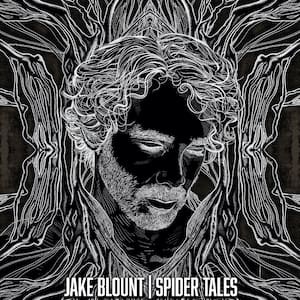 Jake Blount – Spider Tales
Jake Blount – Spider Tales
Free Dirt Records – 29 May 2020
Those familiar with their folklore will know of Anansi, the spider trickster, originating from the Akan people in Ghana and an important figure in West African, African American and Caribbean folklore. Gathered in the Anansesem oral storytelling tradition, the tales relate how Anansi uses his wit and wisdom against oppressors more powerful than himself, and, as such, figured extensively among enslaved Africans and their American descendants as a form of cultural rebellion. It is upon these stories and tradition that banjo and fiddle player Blount, one of the few queer Black artists in the Appalachian folk field, draws for this striking album that looks upon the spiritual, humanitarian and environmental crises and seeks the strength of his forbears to find the will to survive.
Described in the sleeve notes as focused on retribution and pursued by loss, backed by a band of mostly queer musicians, among them fiddle player Tatiana Hargreaves and guitarist Rachel Eddy, its mixture of song and instrumentals is drawn from his research into the Black and indigenous roots of Appalachian music.
Featuring step dance percussionist Nic Gareiss with Blount on banjo, it opens with the sparse hesitant rhythm of Goodbye, Honey, You Call That Gone, a number by Lucius Smith, a Black banjo player from Sardis, Mississippi, before picking up the pace with the lively and mostly instrumental fiddle and banjo duet Roustabout by Dink Roberts from North Carolina.
There are not too many familiar numbers here, but the first comes with guitar and bass joining in on Lead Belly’s Where Did You Sleep Last Night (aka In The Pines), Blount interpreting the lyrics in relation to homelessness. Elsewhere, you’ll also find Rocky Road to Dublin, clearly not an Appalachian tune, but learnt by Blount from the recordings of The Helton brothers, a Cherokee banjo-fiddle duo from Asheville, and the bluesy gospel The Angels Done Bowed Down taken from American Negro Songs collected by John W. Work III in the 30s, here featuring twin fiddles and Jeff Claus on banjo-uke. Work III, a Black scholar, also collected English Chicken from Nashville Black banjo-fiddle duo Nathan Frazier and Frank Patterson while, mentioning the Cherokee, Old-Timey Grey Eagle is another, though more intense, fiddle and banjo romp taken from an early set of recordings by Manco Sneed from North Carolina and part of the Eastern Band of Cherokee Indians. Sneed is also the source for the old-time fiddle instrumental Done Gone.
Again featuring Gareiss’s feet, Move, Daniel is the longest track at just over five minutes, the song learnt from the McIntosh County Shouters and composed by the enslaved Gullah-Geechee people who used it to covertly guide the titular Daniel along a safe route to the master’s smokehouse so that he could steal meat.
At 14 tracks, going into each would be a lengthy process. Still, it would be remiss not to mention the fiddle tune Blackbird Says to the Crow by Cuje Bertram from Fentress County, Tennessee, the Blount solo sawing fiddle work and declaimed vocals of Brown Skin Baby learnt from Mississippi’s Jabe Dillon, as well as the only contemporary number, Beyond This Wall, an instrumental written by Judy Hyman from The Horse Flies and named by her husband after seeing an old photo of the entrance to a lesser-known concentration camp.
It ends in lazy bluesy mood (at least until Hargreaves’ fiddle flourish towards the end) for Mad Mama’s Blues, written, under a pseudonym, by I Ain’t Go Nobody composer Spencer Williams and learnt from a 1925 recording by Josie Miles, a South Carolina blues singer who forged a successful career in New York in the 20s, though the lyrics about taking revenge on white oppression (“Got murder in my eyes…I took my big Winchester/Down off the shelf/When I get through shootin’/There won’t be nobody left”) are anything but laid back.
Unapologetically no-frills and sounding true to the originals, while it will appeal to old-time music enthusiasts as well as those interested in the history of Black string music, there’s plenty here to spark the interest among the casually curious too.
Listen to a track on the latest Folk Radio Show here: https://klofmag.com/2020/05/lost-in-transmission-episode-57/
